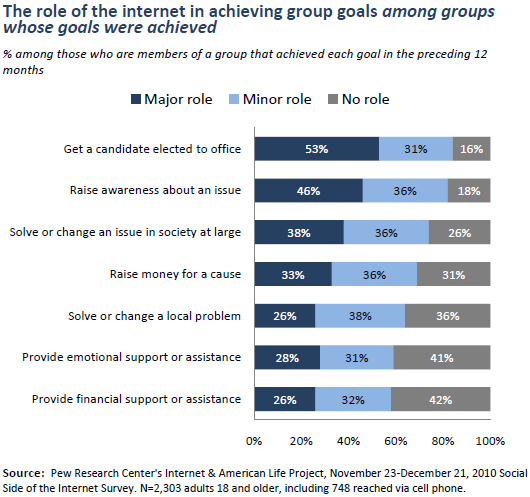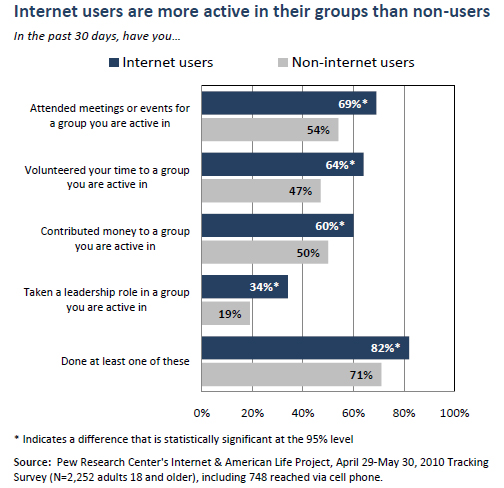The social side of the internet
The internet is now deeply embedded in group and organizational life in America. A new national survey by the Pew Research Center’s Internet & American Life Project has found that 75% of all American adults are active in some kind of voluntary group or organization and internet users are more likely than others to be active: 80% of internet users participate in groups, compared with 56% of non-internet users. And social media users are even more likely to be active: 82% of social network users and 85% of Twitter users are group participants.
The overall impact of the internet on group activities and accomplishments
In this survey, Pew Internet asked about 27 different kinds of groups and found great diversity in group membership and participation using traditional and new technologies. It becomes clear as people are asked about their activities that their use of the internet is having a wide-ranging impact on their engagement with civic, social, and religious groups. Asked to assess the overall impact of the internet on group activities:
- 68% of all Americans (internet users and non-users alike) said the internet has had a major impact on the ability of groups to communicate with members. Some 75% of internet users said that.
- 62% of all Americans said the internet has had a major impact on the ability of groups to draw attention to an issue. Some 68% of internet users said that.
- 60% of all Americans said the internet has had a major impact on the ability of groups to connect with other groups. Some 67% of internet users said that.
- 59% of all Americans said the internet has had a major impact on the ability of groups to impact society at large. Some 64% of internet users said that.
- 59% of all Americans said the internet has had a major impact on the ability of groups to organize activities. Some 65% of internet users said that.
- 52% of all Americans said the internet has had a major impact on the ability of groups to raise money. Some 55% of internet users said that.
- 51% of all Americans said the internet has had a major impact on the ability of groups to recruit new members. Some 55% of internet users said that.
- 49% of all Americans said the internet has had a major impact on the ability of groups to impact local communities. Some 52% of internet users said that.
- 35% of all Americans said the internet has had a major impact on the ability of groups to find people to take leadership roles. Some 35% of internet users said that.
At a personal level, those who are active in groups say the internet has had varying influence over their connection to groups:
- 53% of the online Americans who are active in groups say the internet has had a major impact on their ability to keep up with news and information about their groups; 30% say the internet has had a minor impact on that.
- 41% of these internet-using active group members say the internet has had a major impact on their ability to organize activities for their groups; 33% say the internet has had a minor impact on that.
- 35% of these internet-using active group members say the internet has had a major impact on their ability to invite friends to join their groups; 36% say the internet has had a minor impact on that.
- 33% of these internet-using active group members say the internet has had a major impact on their ability to find groups that match their interests; 28% say the internet has had a minor impact on that.
- 28% of these internet-using active group members say the internet has had a major impact on their ability to create their own groups; 28% say the internet has had a minor impact on that.
- 24% of these internet-using active group members say the internet has had a major impact on their ability to volunteer their time to groups; 40% say the internet has had a minor impact on that.
- 24% of these internet-using active group members say the internet has had a major impact on their ability to contribute money to groups; 34% say the internet has had a minor impact on that.
Many groups work hard to accomplish their goals but do not necessarily succeed in a modest amount of time. In the Pew Internet survey, respondents were asked about several kinds of outcomes and whether groups had achieved them in the previous 12 months. In some cases majorities or significant pluralities had accomplished their goals. For those that had achieved those outcomes, we then asked what role the internet played (if any) in achieving those goals. For those that did succeed, the internet’s role ranged from significant to modest:

On other internet impacts:
- 46% of the internet users who are active in groups say the internet has help them be active in more groups than would otherwise be the case.
- 24% of those active in groups say they discovered at least some of their groups on the internet. However, three times that number of active group members (75%) did not discover any of the groups they belong to online.
- 23% of internet users say the technology allows them to spend more time with their groups; 70% of internet users report no impact of the internet on their time spent with groups.
Social media activities are taking hold in group activities
Groups and their members are using all kinds of digital tools to bind themselves together and some of the most innovative involve social networking sites like Facebook (used by 62% of the internet users in our survey), Twitter (used by 12% of internet users), blogs, and texting (used by 74% of the cell phone owners in our survey) :
- 48% of those who are active in groups say that those groups have a page on a social networking site like Facebook
- 42% of those who are active in groups say those groups use text messaging
- 30% of those who are active in groups say those groups have their own blog
- 16% of those who are active in groups say the groups communicate with members through Twitter
Group members themselves are often active in using social media to connect with the group and evangelize for the group with others: Some 65% of those who are social network site users say they read updates and messages on these sites about the groups in which they are active and 30% say they have posted news about their groups on their SNS page. The numbers are similar when it comes to Twitter users: 63% of the Twitter users who are active in groups say they read updates and posts on Twitter about their groups, and 21% say they post news on Twitter about their groups. Some 45% of the texters who are active in groups say they send and receive texts with other group members and leaders.
Social network and Twitter users are also more active in some parts of group activity: They post about group activities on their Facebook pages and Tweets; they are more likely than others to invite newbies into a group; more likely than others to be targeted for invitation to groups; more likely to use the internet to discover groups; more likely to say the internet enables them to participate in more groups and more likely to say they spend more time on group activities because of the internet. Social media users are significantly more likely than other group participants who go online for group activities, to say that the internet has a “major impact” on their ability to engage with their groups.
Internet users are more active participants in their groups than other adults, and are more likely to feel pride and a sense of accomplishment
The survey asked group members whether they had done several core activities with their group in the past 30 days and internet users were significantly more likely to have done all of these activities.

Perhaps reflecting their higher levels of participation, internet users are also more likely than non-users to say that, in the past 12 months, they have felt really proud of a group they are active in because of something it accomplished or a positive difference it made (62% v. 47%) and that they have accomplished something as part of a group that they could not have accomplished themselves (48% v. 35%). Internet users and non-users are statistically equally likely to say that in the past 12 months they felt disappointed in a group they are active in because it failed to accomplish its goals or lacked purpose. Internet users are, however, slightly more likely to report leaving a group in the past 12 months.
Acknowledgements
The survey covered here was inspired by conversations with Jerry Berman and David Johnson of the Center for Democracy and Technology and Tim Lordan of the Internet Education Foundation. They were enormously helpful in suggesting the appropriate framing for this research and in pondering the particular questions that would yield insights into how Americans use technology to act in groups.


